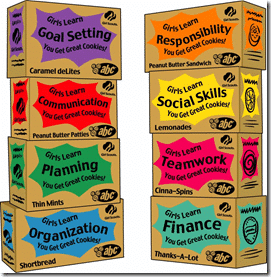Around this time last year I wrote a post about how I would like to change the Girl Scouts, and it received quite a response, both from women who despised their Girl Scout experience as well as those who found my criticism to be narrow-minded and unfounded.
While I still believe in what I wrote, I am willing to acknowledge that the hyperbole used in writing that post was unnecessary and foolish.
And it turns out that I may not be needed after all.
Girl Scouts Madison Vorva and Rhiannon Tomtishen have done a damn fine job of forcing change on their own by boycotting the sale of Girl Scout cookies and convincing others to do the same until palm oil, an ingredient that contributes to deforestation and endangers the habitats of animals like orangutans, is removed from the cookies altogether.
“Initially, Girls Scouts of USA mostly ignored Vorva and Tomtishen’s criticisms. After the girls’ area council leader contacted the national leadership, the teenagers were granted a conference call to plead their case in 2008-but as Vorva puts it, "they mostly talked at us." The issue flared up again recently after the organization moved to restrict comments on their Facebook page, deleting messages that had called for the group to stop using palm oil as part of a social network day of action.”
“Girl Scouts of the USA is finally beginning to listen. Last week Vorva and Tomtishen had a two-hour meeting at the organization’s national headquarters in New York City, and the group agreed to research palm oil to see if they can get more of the ingredient sustainably, or replace it.”
And until they do, Madison Vorva and Rhiannon Tomtishen have pledged to continue applying pressure to the organization in every way that they can.
That includes continuing to boycott those damn cookies.
Ideally, I’d still like the Girl Scouts to stop pretending that this $700 million dollar cookie bonanza is an education opportunity that teaches girls about such buzzwords as finance, communication, organization, and teamwork.
Simply acknowledge that for a couple months every year, in order to fund their organization, little girls and their mothers are converted into an inexpensive sales and distribution system for a large-scale food company.
A little honesty can go a long way.
But what Madison Vorva and Rhiannon Tomtishen are doing is a start, and it is a good reminder that sometimes the best way to change an organization is from within, using grassroots methodology.
Having an ogre like me pounding on the door, demanding that they meet every one of my demands, is not always so effective.




